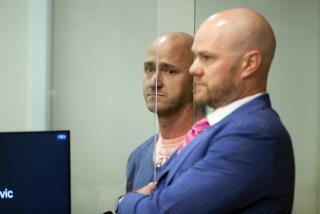Tough Sentencing on Trial in Airline Security Breach
- Share via
WASHINGTON — By allegedly planting box cutters and other prohibited items in aircraft lavatories, college student Nathaniel Heatwole said, he was testing the effectiveness of the nation’s aviation safety regimen after the Sept. 11 attacks.
But his case may also become a test of the fairness of tough new charging and sentencing procedures backed by Congress and U.S. Atty. Gen. John Ashcroft.
The attorney general has been pushing initiatives to limit the discretion of prosecutors and judges in seeking and imposing sentences. Ashcroft’s concern, he has said, is that defendants have been getting a break in certain jurisdictions through plea bargains and other deals, triggering regional disparities that he and others consider fundamentally unfair.
But a lingering question is how the new era of strict enforcement will play out in cases where there are extenuating circumstances.
Heatwole’s case may be a proving ground. To some members of Congress and critics of the Transportation Security Administration, the federal agency charged with preventing terrorist attacks on U.S. aviation, the 20-year-old college student performed a public service by showing it was possible to smuggle potential weapons past airport screeners and onto airplanes.
The government, they say, should learn from Heatwole rather than punish him.
Already, the TSA has revised its procedures for handling tips and complaints it receives from the public. Those revisions were made this week after it became known, through court documents released Monday, that Heatwole had sent the TSA a signed e-mail message Sept. 15 claiming to have smuggled box cutters and other items past airport security on six occasions this year.
Officials only took note of the message after some of those items were found hidden on two planes -- four weeks after the e-mail was sent.
“The work of this well-intentioned college student exposes serious flaws in America’s passenger plane security,” said Rep. Edward J. Markey (D-Mass.). “As a punishment for breaking the law, this college student should be sentenced to working 20 hours a week for the TSA.”
Should prosecutors choose to be aggressive, however, Heatwole could face nearly four years in prison if convicted, said attorneys familiar with federal sentencing guidelines. If Heatwole had a criminal history, he would face up to 10 years -- the statutory maximum for the charge he faces, carrying a concealed weapon onto an airplane.
Ashcroft’s crackdown “comes at a bad time for a defendant like him,” said Mark Allenbaugh, a Washington defense lawyer and former attorney with the U.S. Sentencing Commission, which sets the sentencing guidelines. “Especially because it is such a high-profile case, it is going to be hard for everyone to get on board and agree not to follow the guidelines.”
The result, he said, was apt to be a tough sentence.
Heatwole, of Damascus, Md., was arrested Monday, charged in federal court in Baltimore and released by a federal magistrate on his own recognizance. Days earlier, federal officials had called an emergency search of the nation’s air fleet for hidden weapons, triggered by the discovery Oct. 16 of plastic bags containing box cutters, matches, molding clay and liquid aboard two Southwest Airlines jets.
According to an FBI affidavit filed in the case, Heatwole admitted smuggling the paraphernalia aboard the jets and said he aimed to illustrate holes in the nation’s air safety system.
Heatwole’s attorney, Charles Leeper of Washington, declined through an assistant to comment on the case.
Federal prosecutors said any discussion of sentencing was premature. “It is early in the investigation,” said Vickie LeDuc, a spokeswoman for the U.S. attorney’s office in Baltimore, which is overseeing the case, adding that the issues to be considered in setting any sentence are “complex.”
In April, Congress approved Justice Department-supported legislation that put new restrictions on the ability of federal judges to impose sentences that were softer than those prescribed by federal guidelines, even when they felt the guidelines would be overly punitive under the circumstances.
Putting further heat on federal judges, the Justice Department subsequently began compiling a running list of cases in which judges strayed from the guidelines. Last month, officials adopted additional procedures requiring prosecutors to seek the “most serious readily provable offense” in cases and took other steps to limit prosecutors’ ability to strike plea bargains with lesser sentences.
Judges across the country acknowledge feeling pressure to avoid leniency. “Congress and the attorney general have instituted policies designed to intimidate and threaten judges -- and those policies are working,” Paul Magnuson, a U.S. district judge in Minnesota, said in a recent opinion.
Heatwole’s case could have a wide range of outcomes, depending on how aggressively the government pursues him.
Some defendants facing the same charge as Heatwole would typically receive a sentence of four to 10 months if convicted, assuming they have no criminal record. A defendant who persuaded prosecutors that he accepted “full responsibility” for his actions could avoid jail altogether and be sentenced to probation, say Allenbaugh and other attorneys familiar with the guidelines.
But Heatwole could also face a much stiffer penalty -- 37 to 46 months -- if prosecutors decided the offense was committed “willfully” and “with reckless disregard for the safety of human life.”
Allenbaugh said that Ashcroft’s recent mandates could lead prosecutors to feel compelled to seek tough rather than lenient sentences. Other attorneys said prosecutors might be able to argue that the alleged offense deserved a tough sentence because it was “willful.” According to the FBI affidavit, Heatwole said in his e-mail that he knew he was breaking the law.
“Clearly, he loses on willfulness,” said Frank Bowman, a visiting professor at Wake Forest University law school and a former sentencing commission attorney. “It comes down to whether there was reckless disregard for human life.”
Bowman said the fact that prosecutors agreed to release Heatwole on his own recognizance and without bail suggested that the government might not throw the book at him.
“That certainly suggests to me that the local U.S. attorney is not inclined to kick the stuffing out of him, though I suspect [Heatwole] is going to have issues with the guidelines,” Bowman said. “My guess is he is probably looking at time.”
More to Read
Sign up for Essential California
The most important California stories and recommendations in your inbox every morning.
You may occasionally receive promotional content from the Los Angeles Times.












